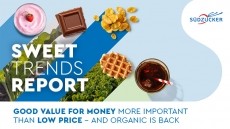Sugar reduction scheme a ‘Soviet-style diktat’

Food companies have managed only a 3% reduction in sugar from products, according to a report from Public Health England (PHE) covering progress from 2015 to 2019.
PHE oversees the voluntary sugar reduction plan and wider reformulation programme on behalf of the government. PHE will itself be scrapped in April next year to be replaced with a UK-wide 'health protection' institute.
Its report found sugar content in retailer and manufacturer branded breakfast cereals, yogurts and fromage frais fell nearly 13%. Puddings rose 9%, put down to the inclusion of mince pies for the first time in 2019. Excluding mince pies, the category rose 4.9%.
Sugar levels in chocolate and sweet confectionery remained relatively unchanged, but people are eating more. Product sales rose 16% and 7% respectively between 2015 and 2019.
Sales are also up for sweet spreads and sauces (12%) and for ice cream, lollies and sorbets (8%).
Average overall sugar reduction across all food categories stood at 3%, unchanged from the previous year’s report.
The report revealed ‘marginal progress’ in reducing sugar in products in the eating out of home sector, such as cakes and puddings purchased from restaurants or cafes, although calories in these products have declined.
Overall, there was a 2.6% increase in the tonnes of sugar sold in the products studied. The population also increased during this period, effectively meaning no change in the amount of sugar purchased per person.
Success for Soft Drinks Levy
The report did highlight the success of the Soft Drinks Industry Levy (SDIL) with average sugar levels in drinks subject to the levy falling by 44% between 2015 and 2019 for retailers and manufacturers. Overall, sugar consumed through these products has fallen even as sales have increased.
Dr Alison Tedstone, Chief Nutritionist at PHE, said: “Too much sugar is bad for our health and most of us are consuming more than we need, often without realising it.
“We’ve continued to see some progress in reducing sugar in a number of everyday food and drink products and this shows that success is possible through reformulation.
“Yet, overall progress remains too slow. Faster and more robust action is needed to help us consume less sugar, which will help us become healthier and lower the economic burden of obesity and preventable pressure on the NHS.”
Each year, the NHS spends an estimated £6.1bn treating overweight and obesity related ill-health. PHE said it will continue to provide expert advice to government on the potential levers to address excess sugar consumption. The government is committed to further action if progress is not made.
'Voluntary sugar reduction programme is simply not working'
Public Health campaigner Action on Sugar said the report highlighted the need for compulsory reformulation targets across the whole of the food and drink industry to gradually reduce the amount of sugar and excess calories in food and drink.
Graham MacGregor, Chairman of Action on Sugar, Professor of Cardiovascular Medicine, Queen Mary University of London said: "Apart from the sugary drinks levy, it’s abundantly clear that the Government’s voluntary sugar reduction programme is simply not working, after reporting a dismal 0.1% reduction in sugar between 2018 and 2019.”
“Food and drink companies that want to do the right thing are crying out for a level playing field, which can only be achieved by setting mandatory targets for calorie and sugar reduction. The soft drinks levy has shown that this approach is both best for business, and best for everyone’s health, including people from more disadvantaged groups.”
'Reformulation costs custom'
Others suggested that targets, mandatory or otherwise, should be scrapped altogether. Christopher Snowdon, IEA Head of Lifestyle Economics, said: “The sugar reduction scheme was always doomed to fail because it relies on companies making products that people don't want to buy. The 20% target is a Soviet-style diktat that takes no account of the realities of food manufacturing or consumer demand. Thankfully, Public Health England will soon be history. The food reformulation scheme should be buried with it.”
The industry still believes voluntary targets work
The UK Food and Drink Federation defended much of the progress highlighted in the report. The industry body’s Chief Operating Officer, Tim Rycroft, said: “Today’s report from PHE shows that food and drink manufacturers are continuing to reformulate and change portion sizes in order to remove sugar from the nation’s diet. Particularly notable is the great progress made by manufacturers to slash sugar in milk drinks, showing once again voluntary action by industry works when realistic goals are set. As expected, we continue to see varying results in food due to the many different roles sugar can play in food and how acceptable changes are to our shoppers and consumers.
“FDF’s members have been fully engaged with the programme and have been working hard to reduce sugars in products, where practically possible. Compared with just four years ago, FDF members' products now contribute 11% fewer calories, 11% fewer sugars, and 14% less salt to the average shopping basket. It is now vital that the UK Government do not take away the ability of manufacturers to make shoppers aware of these healthier options.
“FDF have long said that PHE’s sugar reduction guidelines and timeframes are ambitious and won’t be met across all categories. The report’s data is from 2019 and therefore it is not reflective of the products on the market currently where further progress may have been made. As PHE have themselves pointed out, reformulation takes time – it can't happen overnight.”


























